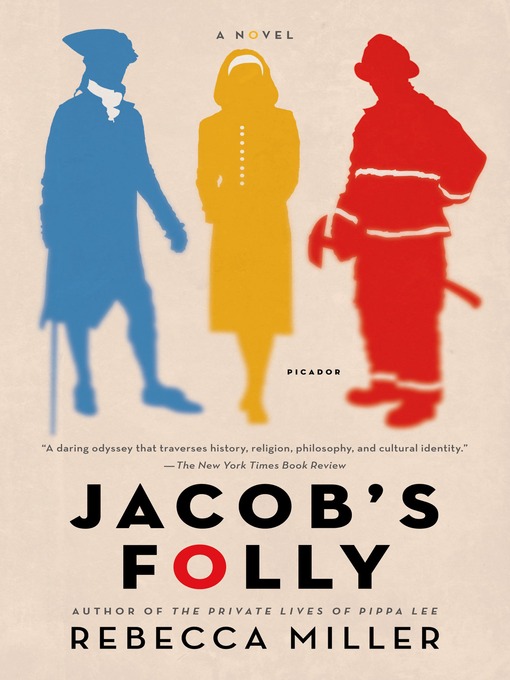
Jacob's Folly
A Novel
کتاب های مرتبط
- اطلاعات
- نقد و بررسی
- دیدگاه کاربران
نقد و بررسی

January 7, 2013
Suspending disbelief is the biggest challenge of Miller’s audacious new novel, not least because the Jacob of the title is a Jewish peddler from late 18th-century Paris who has been reincarnated on Long Island in the 21st… as a fly. Jacob the fly becomes a kind of demon to a melancholy volunteer firefighter named Leslie and a lovely but conflicted Jewish actress named Masha. When Jacob realizes he can discern their dreams and influence their actions he determines to change their fates. The narrative buzzes back and forth through time, chronicling Jacob’s shedding of his Jewish identity to become valet to the comte de Villars and, in time, an actor in the Comédie-Française, while keeping the reader abreast of the unraveling lives of Leslie and Masha. Scads of narrative threads are sewn together with impressive and often lovely wordplay to form a vast historical fabric of Jacob’s Jewish family. Miller (The Private Lives of Pippa Lee) almost takes the to and fro trajectories too far, but she is so clever when dwelling in the mind and body of that insect that the reader is rarely exasperated. An unusual and absorbing read. Agent: Sarah Chalfant, the Wylie Agency.

Starred review from December 15, 2012
A hugely ambitious, wildly imaginative novel by Miller (The Private Lives of Pippa Lee, 2008, etc.) about a dead 18th-century French Jew brought back to life as a fly in 21st-century America. Having died at age 31 in 1773 Paris, Jacob Cerf thinks he's been turned into an angel when he first "wakes up" hovering above Leslie Senzatimore in front of his Long Island home. But Jacob is no angel, although his supernatural powers include reading thoughts, traveling through others' memories and perhaps implanting ideas. He quickly understands Leslie, who has coped with his life's traumas, including his father's suicide and his son's deafness, by becoming a gentile mensch. The volunteer firefighter is a devoted husband and father who supports his extended family of losers even when his boat repair business is struggling through the recession. Leslie's genuine goodness reminds Jacob of his father, an observant Jewish peddler unhappy at Jacob's lack of interest in Torah, so Jacob wants to topple Leslie from his pedestal of righteousness. Accompanying Leslie on a hospital visit, Jacob wanders off and lands (literally) in the room of Masha, a lovely 21-year-old Orthodox Jew with heart problems and a secret desire to become an actress (theater is a leitmotif throughout). Falling for Masha, the first Jewish woman he ever loved, Jacob decides to enhance her opportunities by separating her from her family's religious Orthodoxy. He travels between Masha and Leslie planting ideas within their brains until their fates intersect. Meanwhile, Jacob tells his own story: his disastrous arranged marriage, his flirtation with Hasidism, his desertion of his Jewish identity to become the valet of a libertine count, his sexual escapades. The three characters live in different genres: Jacob a comical, absurdist picaresque, Leslie a domestic tragedy and Masha a bittersweet coming-of-age melodrama. Yet the parallels, particularly between Masha and Jacob, are unmistakable. Miller forces readers to consider the dangers along with the values of assimilation and pits moral choice against fate. A challenging read, yet remarkably entertaining and ultimately gripping.
COPYRIGHT(2012) Kirkus Reviews, ALL RIGHTS RESERVED.

April 15, 2013
The main character of author and filmmaker Miller's (Personal Velocity; The Private Lives of Pippa Lee) imaginative new novel is an 18th-century Jewish peddler reincarnated as a fly on contemporary Long Island, NY. At first devastated to discover that he is not an angel, as he first presumed, Jacob Cerf nonetheless exerts a mysterious influence on two individuals: Leslie Senzatimore, a saintly boat remodeler, and Masha, a young Orthodox Jewish woman. Jacob feels compelled to pull Masha away from her religion and to knock Leslie off his do-gooder pedestal. The book juggles the stories of Masha and Leslie, who eventually meet, along with Jacob's travails from a few hundred years earlier. All three stories fascinate, especially the rules of ultra-Orthodoxy, which provide both comfort and restriction. The early part of the novel offers dazzling insights into life from a fly's perspective, though disappointingly that aspect of the book quickly dissipates. The lives of the main characters depict the complexity of exploration in faith and free will that makes for a deeply involving story. VERDICT Highly recommended for fans of Virginia Woolf's Orlando, whose time-traveling main character offered similar insights into fate and freedom. [See Prepub Alert, 10/1/12.]--Evelyn Beck, Piedmont Technical Coll., Greenwood, SC
Copyright 2013 Library Journal, LLC Used with permission.

Starred review from February 1, 2013
Miller embeds readers in the outsized consciousness of a fly, the modern reincarnation of Jacob, a Jewish peddler taken from eighteenth-century Paris and stripped of his identity. Via an enigmatic capacity to enter minds, the fly encourages young, Orthodox Masha's forbidden stage aspirations while simultaneously inciting a botched bid to rescue her. Because of consistent narration, Miller's intricate plots are never confusing. Rather, they are foils across time and space, offering measurements of survival, belonging, inheritance, the cost of transformationwhether coerced or voluntaryand outcome's overpowering of intention. Jacob acts undetected by his targets, but a far more inscrutable figure reveals his role in the satisfying conclusion. The novel breathes sensuality, creating sounds of languages mixing in dusty streets, the feeling of being bareheaded, without yarmulke, for the first time, and even an orange's distinctive smell. Readers will chuckle contentedly and without malice at a violent, life-affirming death. A deeply pleasurable, darkly comic, and original reinterpretation of Jewish history's indestructible storyline, alighting thoughtfully on forces both individual and collective, internal and external, from genocide to assimilation.(Reprinted with permission of Booklist, copyright 2013, American Library Association.)

























دیدگاه کاربران